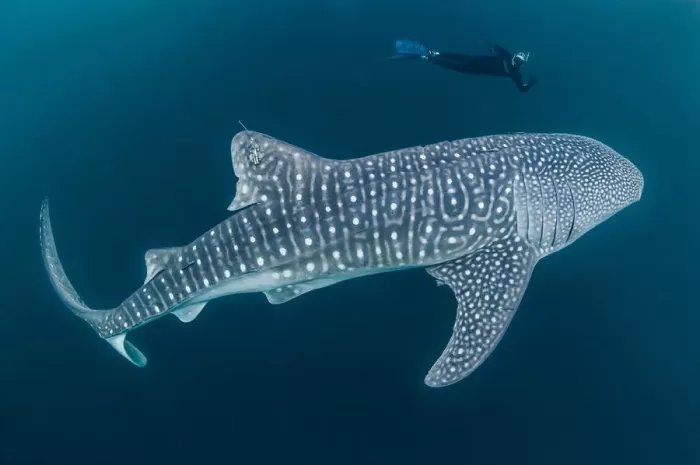
Given Indonesia’s vast geographical area, particularly its seas, marine ecotourism holds plenty of potential to be developed. The development and expansion of marine tourism will also benefit economic development and ecological preservation. Marine ecotourism, fundamentally, embodies a sustainable utilization of coastal natural resources within an environmental service framework. At its core, marine ecotourism is a strategic approach to tourism development, aiming to harmonize economic prosperity with environmental conservation.
Papua, situated in the eastern expanse of Indonesia, boasts an array of natural marvels, ranging from verdant rainforests to vibrant coral reefs. Among these treasures, the presence of whale sharks has emerged as a symbol of hope for sustainable economic advancement through ecotourism. One particular area renowned for being a place where these animals are found in large numbers is Cenderawasih Bay.
Cenderawasih Bay, nestled within Papua, has garnered substantial attention and demand as a marine tourism hotspot in Indonesia. Renowned for its remarkable biodiversity and breathtaking natural vistas, Cenderawasih Bay distinguishes itself as a premier destination unrivalled by other coastal areas in the nation.
At the core of the bay’s allure lies its unparalleled marine biodiversity, highlighted by a phenomenon scarcely encountered elsewhere in Indonesia: the whale sharks which inhabit the area. These majestic creatures, renowned for their gentle demeanour and imposing form, inhabit the waters of Cenderawasih Bay year-round, establishing it as a renowned sanctuary for this species. This distinctive characteristic elevates Cenderawasih Bay to a must-visit locale for eco-tourists and wildlife enthusiasts, offering unmatched opportunities for encountering these graceful giants in their natural habitat.
As daily whale shark sightings continue to enchant visitors, the area presents a great opportunity for the development of ecotourism. Within Papua, the burgeoning whale shark ecotourism sector holds immense economic potential, creating streams of revenue that permeate various sectors of the economy. Tourist expenditures, spanning accommodations, transportation, dining, and souvenirs, form the bedrock of economic growth in coastal communities. Furthermore, the emergence of ecotourism enterprises, such as tour operators and dive centers, serves as a catalyst for job creation and entrepreneurship among local residents. These ventures not only provide employment opportunities but also foster skills development and capacity building, empowering individuals to actively participate in the burgeoning ecotourism industry.
In addition, through active involvement in tourism-related activities, such as guiding, boat operations, and cultural presentations, local populations are afforded opportunities for socio-economic inclusion and cultural preservation. Moreover, revenue-sharing mechanisms ensure that communities directly reap the benefits of ecotourism, thereby enhancing their standard of living and nurturing a sense of ownership over their natural resources. By embracing the principles of sustainable tourism development, whale shark ecotourism in Papua serves as a beacon of hope for holistic socio-economic advancement. It embodies a model wherein economic prosperity coexists harmoniously with environmental conservation and cultural preservation.

